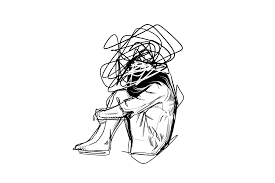In the labyrinth of human experience, there exists a pervasive sense of unease, an existential anxiety that gnaws at the core of our being. It is a profound contemplation of our existence, our purpose, and our inevitable mortality that often accompanies our journey through life.
This existential angst, as coined by philosophers such as Kierkegaard, Heidegger, and Sartre, transcends cultural and temporal boundaries, manifesting in various forms but sharing a common thread of grappling with the fundamental aspects of human existence.
Defining Existential Anxiety
Existential anxiety arises from a confrontation with the essential aspects of existence: freedom, meaninglessness, isolation, and death.
At its heart, it questions the significance of our actions in the vastness of the universe and the ultimate purpose of our lives.
Unlike everyday worries or specific fears, existential anxiety is more elusive, permeating our consciousness and unsettling our sense of security in the world.
The Roots of Existential Anxiety
- Freedom and Responsibility: One of the fundamental aspects contributing to existential anxiety is the realization of human freedom. While freedom grants us the ability to shape our lives and make choices, it also burdens us with the responsibility of those choices. This burden can evoke anxiety as we confront the uncertainty and consequences inherent in our decisions.
- Meaning and Meaninglessness: Existential thinkers ponder the question of whether life inherently holds meaning or if we must create our own meaning in a seemingly indifferent universe. The absence of a predetermined purpose can lead to feelings of existential emptiness and anxiety as individuals grapple with the search for significance.
- Isolation and Connectedness: Despite our interconnectedness with others, existential anxiety often stems from a profound sense of existential isolation. This isolation arises from the recognition that each individual experiences life subjectively and ultimately faces their own existential dilemmas alone.
- Death and Mortality: Perhaps the most universal source of existential anxiety is the contemplation of death. Confronting our mortality forces us to confront the finite nature of our existence, prompting questions about the legacy we leave behind and the meaning of our lives in the face of inevitable demise.
Manifestations of Existential Anxiety
Existential anxiety manifests differently in individuals and can influence various aspects of life, including:
- Emotional Well-being: Feelings of despair, restlessness, or a persistent sense of unease.
- Interpersonal Relationships: Difficulty in forming meaningful connections or maintaining intimacy due to fear of vulnerability or existential isolation.
- Occupational Pursuits: Struggles in finding satisfaction or purpose in work, questioning the meaningfulness of career choices.
- Spiritual and Philosophical Beliefs: Exploration of spiritual or philosophical frameworks in an attempt to find answers to existential questions.
- Behavioral Patterns: Engaging in avoidance behaviors or compulsive activities as a means of distracting oneself from existential concerns.
Coping Strategies
While existential anxiety may appear daunting, several strategies can help individuals navigate its complexities:
- Acceptance and Awareness: Acknowledging the existence of existential anxiety and understanding its roots can empower individuals to confront their fears and uncertainties more effectively.
- Finding Meaning: Engaging in activities that align with personal values and beliefs can imbue life with meaning and purpose, mitigating feelings of existential emptiness.
- Connecting with Others: Cultivating meaningful relationships and fostering a sense of community can alleviate feelings of existential isolation.
- Exploring Existential Philosophies: Studying existential philosophy and literature can provide insights into the human condition and offer alternative perspectives on existential concerns.
- Seeking Professional Support: Consulting with therapists or counselors trained in existential therapy can provide guidance and support in addressing existential anxiety.
Conclusion
Existential anxiety serves as a poignant reminder of the complexities inherent in human existence. It challenges us to grapple with profound questions about life, freedom, meaning, and mortality.
While navigating existential anxiety may feel daunting, it also presents an opportunity for personal growth, self-discovery, and the cultivation of a deeper understanding of what it means to be human.
By confronting these existential dilemmas with courage and introspection, individuals can ultimately forge a path towards greater clarity, resilience, and a more authentic engagement with life’s uncertainties.

